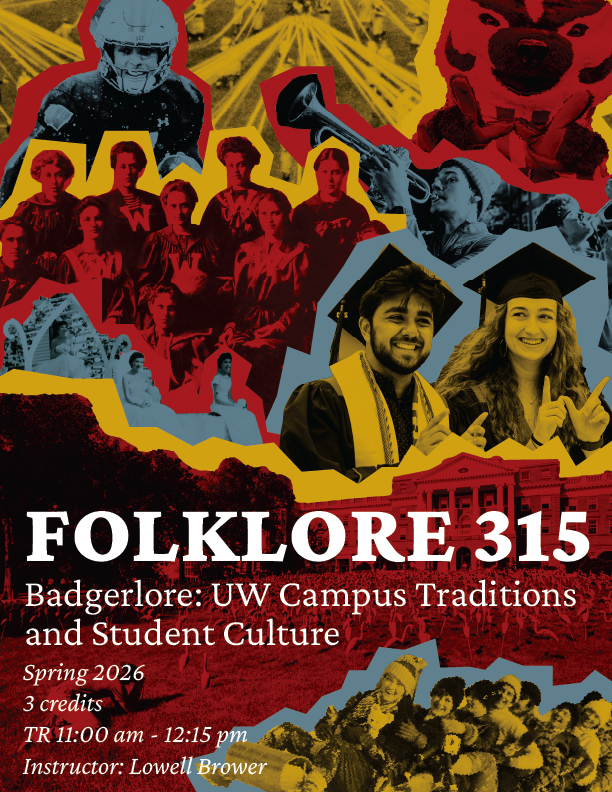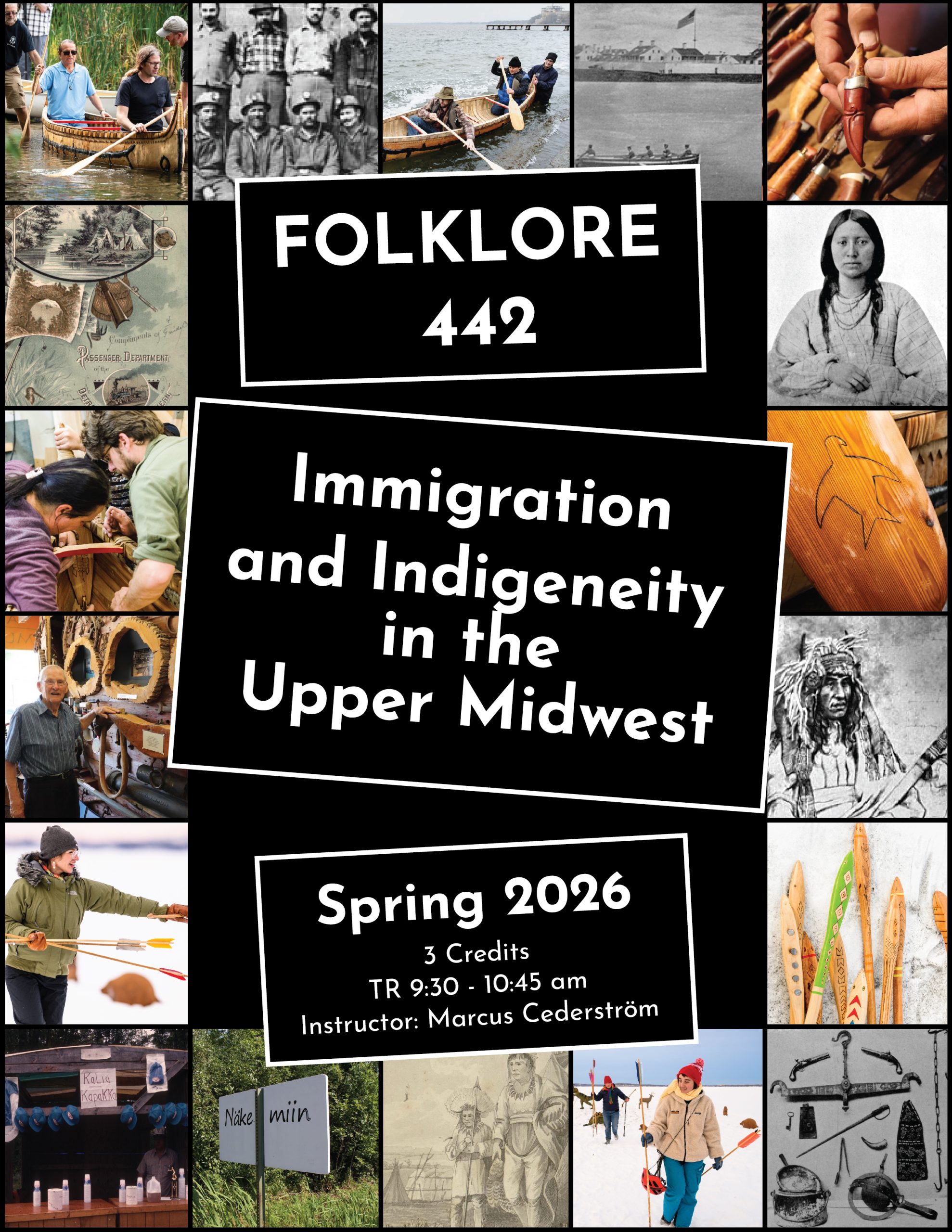Featured Courses


This is an accordion element with a series of buttons that open and close related content panels.
FOLKLORE 100 - Introduction to Folklore
(3 credits)
- Lecture 001: TR 2:25 – 3:15 pm
- Discussion 301: W 8:50 – 9:40 am
- Discussion 302: W 3:30 – 4:20 pm
- Discussion 303: R 8:50 – 9:40 am
- Discussion 304: R 9:55 – 10:45 am
- Discussion 305: F 8:50 – 9:40 am
- Discussion 306: F 3:30 – 4:20 pm
- Discussion 307: W 2:25 – 3:15 pm
- Discussion 308: F 9:55 – 10:45 am
- Discussion 309: M 4:35 – 5:25 pm
- Discussion 310: T 7:45 – 8:35 am
Instructor: Lowell Brower
Course Description: This course serves as an introduction to folklore; that is, the arts, beliefs, stories, sayings, customs, and ways of communication we engage with in our everyday lives. We’ll be examining a variety of folklore genres, while also learning about and employing the methods and practices of folklore scholars. Because this is a practical as well as theoretical course, we will be conducting fieldwork in the region as part of a semester-long folklore project. By the end of the term, you will be able to better understand what folklore is, how and why it functions, and the many and often hidden ways that it is a part of our everyday lives. You’ll learn about ethnographic methods and techniques and how to use interviews, photography, and videography to document various genres of folklore. You’ll better understand what culture is, how it affects our everyday lives, and how it is transmitted, changed, created and re-created, lost, found, and reclaimed.
(NON-GNS+) FOLKLORE 102 - Introduction to Comparative US Ethnic and American Indian Studies
(3 credits)
- Lecture 001: TR 11:00-11:50 am
- Discussion 301: R 1:20-2:10 pm
- Discussion 302: R 2:25 – 3:15 pm
- Discussion 303: R 3:30 – 4:20 pm
- Discussion 304: R 4:35 – 5:25 pm
- Discussion 305: F 9:55 – 10:45 am
- Discussion 306: F 11:00 – 11:50 am
- Discussion 307: F 1:20 – 2:10 pm
- Discussion 308: F 2:25 – 3:15 pm
Instructor: Ethelene Whitmire
Course Description: Introduction to comparative ethnic studies, examining race, ethnicity, and indigeneity within the United States. Includes perspectives from African American, American Indian, Asian American, and Chican@ and Latin@ studies.
FOLKLORE 104 - Sacred Places and Journeys
(3 credits)
- Lecture 001: MW 11:00 – 11:50 am
- Discussion 301: F 9:55 – 10:45 am
- Discussion 302: F 9:55 – 10:45 am
- Discussion 303: F 11:00 – 11:50 am
- Discussion 304: F 11:00 – 11:50 am
- Discussion 305: F 12:05 – 12:55 pm
- Discussion 306: F 1:20 – 2:10 pm
Instructor: Thomas DuBois
Course Description: An introduction to the study of religion through the lens of sacred places and journeys, including pilgrimage.
Prerequisites: None.
(NON-GNS+) FOLKLORE 210 - The African Storyteller
(3 credits)
Course Description: The oral tradition and the written word; the composition of stories, relationship between performer and audience, and transmission of tradition in various African societies.
FOLKLORE 225 - Horror as Expressions of National Angst
(3 credits)
- Lecture 001: TR 11:00 am – 12:15 pm
Instructor: Scott Mellor
Course Description: Horror as Expressions of National Angst explores how horror reflects cultural and national anxieties across time and place. Beginning with 16th- and 17th-century witch hunt narratives, the course traces how horror has served as a mirror for societal fears—from classics like Frankenstein and Dracula, to the cosmic dread of H.P. Lovecraft, and the post-apocalyptic isolation of I Am Legend. Students will examine how horror evolves in response to historical trauma, political unrest, and shifting cultural identities, including modern cinematic expressions such as 28 Days Later, Night of the Living Dead, and the socially charged films of Jordan Peele. Through weekly writing, group projects, and critical essays, students will analyze how horror functions as both entertainment and cultural critique, revealing the deep connections between fear, identity, and national consciousness.
FOLKLORE 315 - Badgerlore Campus Traditions
(3 credits)
- Lecture 001: TR 11:00 am – 12:15 pm
Instructor: Lowell Brower
Course Description: What’s up with those Bascom Hill flamingoes? Where did Bucky get his name? What’s the wildest thing that ever happened at Mifflin? How many ghosts haunt Science Hall? Why do otherwise congenial classmates take joy in chanting “Eat S*&%! F$#@ You!” at one another every couple of weeks in the Fall? Which campus club has the most complex initiation ritual? Why is there a Paul Bunyan room in Mem U? What are the 3 ‘rituals’ that every UW student must attempt before graduation? What lurks in the steam tunnels beneath campus? Are there any UW classes where I can research Humanities bathroom graffiti (‘latrinalia’), practice witchcraft at Picnic Point, study all the fun weird traditions me any my roommates participate in, and go tailgating for credit? The answer to all of those questions and more are waiting for you in “Folklore 315: Badgerlore: Campus Traditions and Student Folklife”
In this Sconnie-centric course, we’ll examine the complex cultural expressions, practices, beliefs, identities, and traditions and that make UW-Madison the fascinating, folksy, diverse, and dynamic place that it is. Using campus as our fieldsite, we’ll learn about the basic concepts in the discipline of folklore as they relate to everyday student ‘folklife,’ campus traditions, and the rich cultural history of the multigenerational, 176-year-old Badger folk group!
Folklorists rely heavily on conducting ethnographic fieldwork and students in this course will document local cultural traditions, conduct ethnographic interviews about cultural activities relating to student life on campus, collect oral histories and document vernacular memories of former badgers. We’ll also engage in experiential learning by participating in various traditional practices like tailgating, campus ‘legend tripping,’ ice-cream eating, atlatl spear throwing, and *hopefully* sledding! Students will also explore a variety of public folklore productions throughout the semester and will evaluate their content and efficacy, while also developing their own projects to showcase the weird, wondrous world of ‘Badgerlore.’ Will there be opportunities to study campus ghosts, sports fandoms, transgressive rituals, and online communities like UW Memes for Milk-Chugging Teens and #Wisco TikToks? You betcha! So if you want to be a Badger, just come along with Folklore 315…
Prerequisites: Sophomore standing
FOLKLORE 315 - Topics: Family and Found Family Folklore
(3 credits)
- Section 002: MW 2:30 – 3:45 pm
Instructor: Jason M. Schroeder
Course Description: Explore the stories, practices, traditions, customs, and rituals of biological and chosen families.
Prerequisites: Sophomore standing
FOLKLORE 317: The Irish Tradition
(3 credits)
- Lecture 001: TR 4:00 – 5:15 pm
Instructor: Thomas DuBois
Course Description: Survey of Irish folklore and folklife, including narrative, music, dance, customs, material culture, and foodways, in both Ireland and beyond.
Prerequisites: Sophomore standing
(NON-GNS+) FOLKLORE 319: Afro Asian Improv: From Hip Hop to Martial Arts Fusion
(3 credits)
- Lecture 001: MW 2:25 – 4:05 pm
Instructor: Peggy Choy
Course Description: An Afro Asian perspective provides a lens through which intersections between Asian American and African American dance and martial arts are studied and practiced. Asian American and African American movement genres provide tools to explore dance fusion, choreography, and improvisation, to create dances informed by African American and Asian American legacies of struggle, innovation and transformation, while cognizant of historical forces of oppression and racism. Building connections through respectful communication with others are learned through dance practice, discussion and writing about concepts learned through readings, videos, and guest artist visits. Engagement with dance as a cultural vehicle for creative problem-solving and risk-taking occurs through guided class or smaller group activities.
Prerequisites: Sophomore standing
FOLKLORE 320 - Folklore in Wisconsin
(3 credits)
- Lecture 001: M TR 1:00 – 2:15 pm
Instructor: Anna Rue
FOLKLORE 442: Immigration and Indigeneity in the Upper Midwest
(3 credits)
- Lecture 001: TR 9:30 – 10:45 am
Instructor: Marcus Cederström
Course Description: The story of the Upper Midwest is one of indigeneity and immigration. Long inhabited by Indigenous communities, the region has been subjected to continuous colonization since the 1600s. Europeans and Yankees alike moved to the region and today make up a large percentage of what we often stereotype as the Midwest. But the communities of the Upper Midwest are diverse and ever changing. The Upper Midwest is made up of rural and urban, old migrant communities and new, Indigenous and immigrant, and a host of other identities that are constantly in contact, changing and adapting. We’ll be examining the lived experiences and folklore of some of these communities, by looking at first-person accounts, reading histories of the region, watching films about the many unique traditions in the area, and discussing our own expertise and experiences about immigration and indigeneity. By learning more about the complicated intersections of immigration and indigeneity, we can better understand the history and vernacular expressions of the people who call the Upper Midwest home. This is a practical as well as theoretical course, so class projects will incorporate ways in which you can (and will) make your research available to the public.
Prerequisites: None
(NON-GNS+) FOLKLORE 516: Ethnographic Methods for Music and Sound
(3 credits)
- Seminar 001: MW 9:30 – 10:45 am
Instructor: John Walsh
Course Description: Focuses on the tools (material, methodological, and ethical) for doing ethnographic fieldwork in musical contexts.
Prerequisites: Graduate/professional standing
(NON-GNS+) FOLKLORE 915: Seminar in Ethnomusicology
(3 credits)
- Lecture 001: T 2:25 – 4:45 pm
Instructor: John Walsh
Course Description: Topics in ethnomusicology within a cross-cultural framework; melodic typology, scale and tuning systems, mode, rhythm, ornamentation, improvisation techniques, oral and written traditions of composition, notation systems, and function of music society.
Prerequisites: Graduate/professional standing